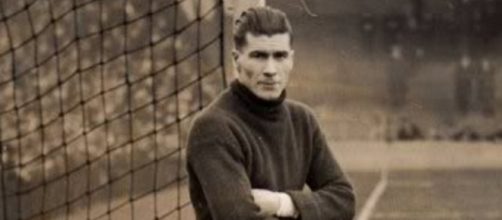When Everton turned their noses-up at signing Broadway United’s goalkeeping sensation Elisha Scott because he was too young in 1912, they had no idea of the talent that they were passing on. Upon the Toffees’ rejection of the young man, his older brother Billy went to Reds’ chairman John McKenna to tip him off instead. This time he found some luck, as McKenna moved quickly to secure the services of the 19-year old with the intention of making him the No.2 behind Kenny Campbell, in his twilight years at the club.
Scott got his chance sooner than expected though, making his debut on New Year’s Day 1913, keeping a clean sheet and impressing so much that immediately after the game, the Magpies submitted a £1,000 bid for the youngster, a large sum back then.
The interest turned the teenager’s head, but manager Tom Watson rejected Newcastle’s advances and ensured that Scott’s future would be at Anfield. From there until the end of the 1914/15 season, Scott became first-choice between the sticks, dislodging the ageing Campbell from his position and marking the beginning of an era.
Scott’s career was under threat from an untimely interruption
At the end of that season, the Football League suspended competitive football due to the outbreak of World War One, meaning that Liverpool would not take part in any league football for that season. Though no-one knew it yet, the war would drag-on until late-1918, leaving top players around the country without a team to play form.
Scott decided in the interim to return to his native Northern Ireland, turning-out for Belfast United, Linfield and Belfast Celtic until 1919 when the league was reinstated, and he could return to Liverpool to continue his promising career. Campbell left the club a year later, allowing Scott unrivalled access to the number one jersey for what would turn out to be the next fifteen years. Over that decade-and-a-half period Scott secured his place in the LFC Hall of Fame, producing stunning saves and keeping clean sheets for fun on his way to becoming one of the first real fans’ favourites at Anfield.
He was a pivotal part of the team that won back-to-back championships from 1921 to 1923, only missing three games over the course of the two seasons and forcing his way into the Irish international side for the first time.
He only earned 26 more caps after that one, a figure that seems extremely low for a player of Scott’s calibre, but these were the times before the advent of World Cups and European Championships, and so international opportunities were much more limited.
His playing career had to end eventually, but football remained in his blood.
Just as he had come in and replaced Kenny Campbell, Scott was under-threat upon the arrival of Arthur Riley in the late-1920s, getting less-and-less playing time each season until, in 1934, he decided it was time to leave. Cross-town rivals Everton offered £250 to take him to Goodison, but the club rejected the offer after a letter-writing campaign from Reds supporters against the idea.
Instead, Scott made his last appearance for Liverpool in February of that year – he was headed back to Belfast Celtic to be their player-manager. Such was the reverence for this man at Anfield, it is said that when he gave a speech to the directors’ box at the final home game of that season, he reduced the entire room to tears.
Scott’s appearance record at Liverpool of 467 games remained intact until it was surpassed by Billy Liddell, another of the city’s adopted sons, in 1957. A player of Scott’s standing in the game is always going to be the subject of folklore and legend, one such story concerning his rivalry with Everton’s great striker Dixie Dean. Rumour has it that the day before Ireland played England in Belfast, the pair met walking down the street in the city.
Dean supposedly nodded in Scott’s direction, prompting the Irishman to dive across the pavement to save the striker’s ‘header’, much to the delight of witnesses. Whether or not the story has any truth to it is unknown, but even if the story is apocryphal in nature, it remains part of Scott’s famous legacy. Despite the recent upturn in form of current No.1 Loris Karius, Liverpool fans would likely give anything for another ‘keeper of Elisha Scott’s calibre and standing to come along.




